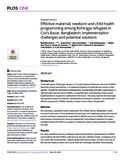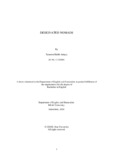| dc.contributor.advisor | Rahman, Shahidur | |
| dc.contributor.author | Khan, Ahmed | |
| dc.date.accessioned | 2025-02-18T06:16:32Z | |
| dc.date.available | 2025-02-18T06:16:32Z | |
| dc.date.copyright | 2024 | |
| dc.date.issued | 2024-10 | |
| dc.identifier.other | ID 20217005 | |
| dc.identifier.uri | http://hdl.handle.net/10361/25434 | |
| dc.description | This thesis is submitted in partial fulfillment of the requirements for the degree of Bachelor of Social Science in Anthropology, 2024. | en_US |
| dc.description | Cataloged from PDF version of thesis. | |
| dc.description | Includes bibliographical references (pages 92-103). | |
| dc.description.abstract | The thesis examines the nature of education that Rohingya refugee children accessed in Bangladesh with emphasis on the challenges the children come across in a seemingly endless humanitarian crisis. The purpose of the study was to examine the intervention by nongovernmental organizations (NGOs) as agents of change towards increase access to education especially with a focus on Friendship NGO. The data collection methods included the following: Three focus group discussions that were conducted in the Ukhia region and an interview focused on a key informant from the Friendship NGO. Although the data collection process was supposed to be conducted on site various factors such as security threats and bureaucratic procedures restricted the process, and as a result key informant interviews (KIIs) were conducted remotely. To understand the cultural background of the study community, primary data was collected through focus group discussion (FGDs) conducted by Friendship NGO staff with the parents of Rohingya children and secondary data collection for contemporaneous background information. The findings reveal that socio cultural, language and environmental characteristics of the Learners negatively affect educational interventions in the form of Curriculum developed from Myanmar based, language disparities and home schooling environment respectively. However NGOs’ intervention has remained challenging by structural factors like insufficient utilization of internet, politically instable environment, infrastructure and economic crunch which hinders realization of education for the Rohingya children. This research promotes culturally relevant programs that may address obstacles in education and identity formation among the Rohingya children, who have a bleak future ahead of them, in order to enhance the possibility of a better future for these children. | en_US |
| dc.description.statementofresponsibility | Ahmed Khan | |
| dc.format.extent | 109 pages | |
| dc.language.iso | en | en_US |
| dc.publisher | BRAC University | en_US |
| dc.rights | BRAC University theses are protected by copyright. They may be viewed from this source for any purpose, but reproduction or distribution in any format is prohibited without written permission. | |
| dc.subject | Refugee settlement | en_US |
| dc.subject | Refugee children | en_US |
| dc.subject | Rohingya refugee | en_US |
| dc.subject | Rohingya refugee camps | en_US |
| dc.subject | Humanitarian crisis | en_US |
| dc.subject | NGO | en_US |
| dc.subject.lcsh | Rohingya (Burmese people)--Bangladesh. | |
| dc.subject.lcsh | Refugee children--Education--Bangladesh. | |
| dc.title | Access to education for Rohingya refugee children in Bangladesh | en_US |
| dc.type | Thesis | en_US |
| dc.contributor.department | Department of Economics and Social Sciences, BRAC University | |
| dc.description.degree | BSS in Anthropology | |




